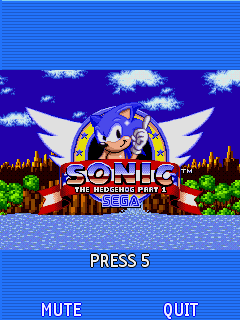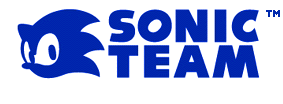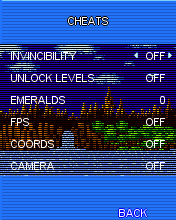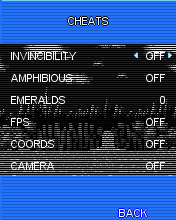🎊 Happy 2025, TCRF! 🎊
Sonic the Hedgehog (DoJa, J2ME, BREW)
| Sonic the Hedgehog |
|---|
|
Also known as: Sonic the Hedgehog Part 1/Part 2 (US/EU), 音速小子(上)/音速小子(下)(CN)
|
Sonic 1 on a mobile phone before the iPhone ports. Originally released through the Japan-only Sonic Cafe service (for i-Mode devices) and later given an inferior port to J2ME, split into two parts (BREW gamers got the one singular game in all regions though).
It seems this version served as the basis for the Game Boy Advance port, Sonic the Hedgehog Genesis, which is generally considered to be the worst port of Sonic 1.
| To do: More regional/version differences. Several Japanese versions for DoJa with the base content are dumped now. |
Contents
- 1 Sub-Page
- 2 Unused Graphics
- 3 Cheat Menu
- 4 MIDI Data
- 5 blkcol.blt
- 6 Revisional Differences
- 6.1 Overview
- 6.2 February 2006 (Initial J2ME release)
- 6.3 March 2006
- 6.4 May 2006
- 6.5 June 2006
- 6.6 July 2006 (Part 2's initial release)
- 6.7 September 2006 (American version)
- 6.8 January 2007
- 6.9 April 2007 (Asian versions)
- 6.10 January 2009
- 6.11 June and September 2009
- 6.12 Samsung Demo
- 6.13 Nokia and Sony Ericsson Demo
Sub-Page
| Bugs |
Unused Graphics
This unused UFO frame is in the Genesis original's prototype build, but was removed in the final. It is, however, present in the February 2006 builds of the J2ME game.
Jumping into a Giant Ring in the J2ME versions awards you the Chaos Emerald immediately, leaving the "Special Stage" graphic unused.
Sonic_team_logo.png appears in some Motorola 240x299 versions of Part 1 and 2. It's possible that due to an oversight, a 240x299 version of ifone.png or glu.png was not generated, and this older image was added into the files instead, not used due to the different filename.
Cheat Menu
At the title screen, press 2, 3, 0, 6, 9, 1 (23/06/91, the US/European release date of the original game) to unlock the cheat menu. The cheat code doesn't seem to function in the Chinese releases, the American release or the demo versions.
- INVINCIBILITY - Makes you invincible. * to toggle it mid-level.
- UNLOCK LEVELS (February and March 2006 releases of Part 1 only) - Doesn't affect anything in the final version, perhaps the original plan was to only have Green Hill 1 unlocked at the start.
- AMPHIBIOUS (Later releases) - Makes it impossible to drown. 0 to toggle it mid-level.
- EMERALDS - Allows you to set the amount of Chaos Emeralds you have.
- FPS - Shows the current number of frames-per-second in the upper-left corner of the screen.
- COORDS - Shows Sonic's coordinates in the upper-right corner of the screen.
- CAMERA - Lets Sonic move in all directions without falling. Use # to toggle it mid-level.
- PLAY ENDING - Plays the good or bad ending depending on the numbers of Chaos Emeralds set. The February 2006 versions of the game do not have this option.
MIDI Data
The text PsmPlayer V5.0 is present at the beginning of every MIDI file in the J2ME version (presumably, it was used in order to convert the .MLD music files from the DoJa version to MIDI). It's not clear at the moment if the developers were given permission to use said software for a commercial game.
blkcol.blt
blkcol.blt is a piece of collision data, stored in its "raw" bitmap-like format, before it was converted to being stored in rows via an unused function.
Revisional Differences
Overview
- This port was originally released in Japan on DoCoMo phones that supported the DoJa platform, at least some of these versions have sound effects and special stages. iFone ported this version to J2ME for the European release, and special stages and sound effects had to go likely due to phones' hardware/software limitations as well as the slightly rushed nature of the port. Of course, the J2ME release was also split into two parts.
- Several versions of the DoJa (i-Mode) release are dumped, however, they require Labyrinth Zone's level data onward to be downloaded from a now-dead server.
- Originally, Part 1 was released with the iFone logo in the intro. Glu Mobile bought iFone somewhere around that time, and Part 2 as well as later releases of Part 1 were instead released with the Glu logo.
- For the most low-end phones, iFone wrote a simpler Sonic gameplay engine that has a closer resemblance to the 8-bit titles. Interestingly, the .PAK format for data storage in these is the same as the one AirPlay used in their Sega games.
- The full low-end Part 1 game was preinstalled on some Nokia 5070, 6070 and 6080 phones.
- Part 2 received several low-end versions seemingly developed and only released in China, using the same engine as The House of the Dead: Nightmare.
- It appears that Sega Mobile commissioned the Japanese company Brizo Interactive to develop altered versions of iFone's port for North America. A singular version (for 176x220 Motorola from 2006) of this release has been found, and differences can be seen in menu navigation and text.
- Several versions are dumped of the Asian J2ME release from 2007, which only credits Sega Corporation, and none of the porting companies.
- Certain Panasonic phone models in Europe and China had a special J2ME version of the game preinstalled in a singular part. While the Chinese firmware of a Panasonic EB-VS3 has been dumped by a third-party source, no extraction attempts for the game have been successful so far.
- Last but not least, the DoJa version was released in Europe by Zenops under the title Sonic the Hedgehog: Contest Version, and the J2ME (MIDP) version was released in Brazil by Tectoy Mobile. These versions are not dumped and therefore will not be covered by this article.
February 2006 (Initial J2ME release)
From the looks of things, iFone finished the first J2ME (MIDP) versions for a couple of models throughout February 2006 (and slightly towards the beginning of March). It seems as though versions for other models were finished later on, and some updated versions for models already covered may have also been released.
3 versions from the February 2006 batch are preserved: v1.0.12 Build 3805 (Sony Ericsson, 176x220), v1.0.22 Build 4283 (Motorola Triplets, 176x204) and v1.0.22 Build 4308 (Motorola V3x, 240x299). While the Motorola Triplets version is for a device with the 176x220 screen resolution, it uses the smaller graphical set from the 128x128 and 128x160 versions as well as a reduced game screen size, likely due to hardware limitations.
The Motorola V3x version doesn't have an iFone logo when starting up, there's a white screen instead for a few seconds. There is an unused logo, but it's called "Sonic_team_logo.png" and it's entirely different from what is actually seen in other versions.
March 2006
iFone releases an update that makes the game more polished.
- Changed audio: Boss theme (Feb 2006 versions are strangely the only ones to feature the intro part), Marble Zone theme (better looping).
| bossstage.mid (Feb 2006) | bossstage.mid (Later Versions) |
|---|---|
| marble_loop.mid (Feb 2006) | marble_loop.mid (Later Versions) |
|---|---|
- Added audio: all Zone intro sections (Feb 2006 versions had none), the Score sound effect ("cash register"), the Sega speech (forum post by a former iFone developer suggests that copyright reasons were why it was originally excluded).
- Changed graphics: Buzz Bomber (shifted around), ring (one more animation frame added), Marble Zone tileset (UFOs mysteriously removed...).
- Added graphics: ending scene foreground.
- The title screen mistakenly uses the second-to-last frame of animation for Sonic in the February versions, in which Sonic is smiling as opposed to frowning. In addition, the title graphic is misaligned by a few pixels compared to the "mask" graphic, making it look like it has a red drop-shadow. This was all fixed in the March versions.
| Feb 2006 (Sony Ericsson, 176x220) | Mar 2006 (Nokia s60v2, 176x208) |
|---|---|
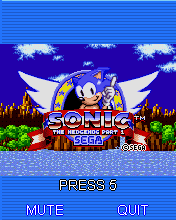 |
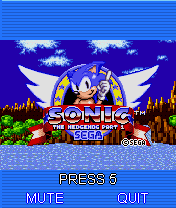 |
- The Zone title cards are misaligned on the stage select screen in the February versions. The "act" graphic is also not displayed correctly. Fixed in the March versions.
| Feb 2006 (Sony Ericsson, 176x220) | Mar 2006 (Nokia s60v2, 176x208) |
|---|---|
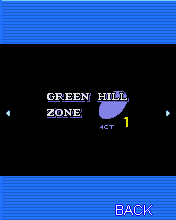 |
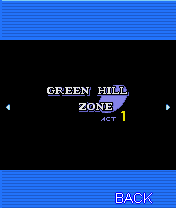 |
- Sonic appears to be much faster in the air in the February versions than in any later releases.
- The time taken for the time bonus to pass depends on how large the time bonus is in the February versions, much like in the original game. This seems to have been changed so that the time taken is always the same in the March versions, possibly because in some long stages, holding 5 upon finishing the stage would cut off the act clear jingle.
- Defeating a boss in the February versions doesn't resume the stage music, unlike the original game or the March versions.
- Level layout files appear to all be different. At least two of the changes concern the placement of the animal capsules in Green Hill 3 and Marble 3.
- March versions added the object graphics to the help screen.
May 2006
iFone finishes a larger batch of versions in May of 2006. These versions have a revamped language system. The useless "Unlock Levels" cheat was replaced by "Amphibious" in preparation for the release of Part 2.
The Samsung 176x220 version released in May is interesting, as it's a midlet suite, and each Zone is a separate midlet.
June 2006
Only one version from the June batch is preserved, and it's for Nokia 240x320 phones. It's one of the earlier versions to bear the Glu Mobile name.
Starting with the June batch, the help and credits screens are glitched due to an off-by-one error.
July 2006 (Part 2's initial release)
Glu Mobile finishes Part 2. The Nokia s60v2 (176x208) version has some interesting debug prints. The Motorola 240x299 version marks the triumphant return of Sonic_team_logo.png.
September 2006 (American version)
Brizo Interactive finishes the American version for Sega Mobile. The preserved version for Motorola (176x204) has some differences compared to the European version:
- The "Enable Sound?" screen was added, making it more similar in this regard to many other J2ME games.
- Two (!) loading bars are present on act intro screens, which make the game load slower than it does otherwise.
- There are noticeable text changes, such as "SONIC HAS PASSED" being replaced with "COMPLETED".
- Green Hill Zone theme was changed:
| greenhill_intro.mid (EU) | greenhill_intro.mid (US, Motorola) |
|---|---|
| greenhill_loop.mid (EU) | greenhill_loop.mid (US, Motorola) |
|---|---|
January 2007
Glu Mobile finishes a new batch of Part 2 versions, two of which are preserved.
April 2007 (Asian versions)
The Asian versions of Part 1 are done. These versions only have a "Sega Corporation" credit in the intro and the credits screen. The preserved Asian versions for Nokia phones have the entire soundtrack replaced with versions with reduced instrumentation, likely for phones with low polyphony (that couldn't play a lot of notes at the same time), and this soundtrack largely resembles the soundtrack of Sonic the Hedgehog Genesis (GBA).
January 2009
Glu Mobile is back with a vengeance, making more versions long after the original release. However, it's possible that these are actually re-releases of older unpreserved versions with new timestamps. These are similar in functionality to the June 2006 version for Nokia 240x320, with the broken text screens and the Glu Mobile logo.
June and September 2009
Glu Mobile finishes the Nokia 360x640 version in June 2009 and a Samsung 240x320 version in September. These have text changes in the pause menu: "BACK TO TITLE" was changed to "QUIT".
Samsung Demo
Part 1 was also preinstalled on various Samsung phones released in Europe, with the company M-Biz Global being credited for programming the demo wrapper. This version starts out as a demo that takes you through a single act of Green Hill and a tiny bit of Marble before asking you to buy the game or go back. Buying the game writes a save file and unlocks the full version. These versions also feature an, uh, rather incomplete Russian language localization.
Wait, have we mentioned the absolutely genius activation procedure?
Okay, so, the game generates the unlocking code randomly on first launch (so there's not really a way to borrow it from someone else, sorry to disappoint). When you confirm to send the message to the premium number, it sends a message with the code, which is then followed by the number sending you back that same code, which you then enter into the window. If that's not inventive, we don't know what is. (Some later M-Biz demos for other games have internet activation instead)
Nokia and Sony Ericsson Demo
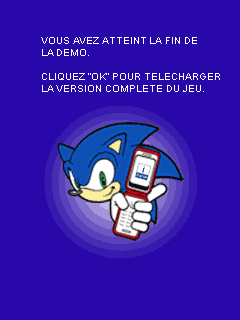
A demo of Part 1 was also preinstalled on certain carrier distributions of Nokia and Sony Ericsson phones (it has been seen on Sony Ericsson W910i from Orange France, for example). This one only has Green Hill Zone 1 as the playable act, and afterwards the game asks you to buy the full game with a screen featuring unique artwork of Sonic with a mobile phone. Only one language is present in these demos. The full version would've been able to be purchased and downloaded from the now-defunct "more games" section of Glu Mobile's website.
Strangely, the phone on the artwork displays the iFone logo even though the Glu logo is displayed when starting the game.
- Pages missing developer references
- Games developed by Sega
- Games developed by iFone
- Games developed by Brizo Interactive
- Pages missing publisher references
- Games published by Sega
- Games published by iFone
- Games published by Glu Mobile
- Games published by Sega Mobile
- Games published by BMIT
- Games published by EA Mobile
- DoJa games
- J2ME games
- BREW games
- Pages missing date references
- Games released in 2005
- Games released in December
- Games released on December 5
- Games released on December 20
- Games with hidden development-related text
- Games with unused graphics
- Games with debugging functions
- Games with hidden level selects
- Games with regional differences
- Games with revisional differences
- To do
- Sonic the Hedgehog series
Cleanup > Pages missing date references
Cleanup > Pages missing developer references
Cleanup > Pages missing publisher references
Cleanup > To do
Games > Games by content > Games with debugging functions
Games > Games by content > Games with hidden development-related text
Games > Games by content > Games with hidden level selects
Games > Games by content > Games with regional differences
Games > Games by content > Games with revisional differences
Games > Games by content > Games with unused graphics
Games > Games by developer > Games developed by Brizo Interactive
Games > Games by developer > Games developed by Sega
Games > Games by developer > Games developed by iFone
Games > Games by platform > BREW games
Games > Games by platform > DoJa games
Games > Games by platform > J2ME games
Games > Games by publisher > Games published by BMIT
Games > Games by publisher > Games published by Electronic Arts > Games published by EA Mobile
Games > Games by publisher > Games published by Glu Mobile
Games > Games by publisher > Games published by Sega
Games > Games by publisher > Games published by Sega > Games published by Sega Mobile
Games > Games by publisher > Games published by iFone
Games > Games by release date > Games released in 2005
Games > Games by release date > Games released in December
Games > Games by release date > Games released in December > Games released on December 20
Games > Games by release date > Games released in December > Games released on December 5
Games > Games by series > Sonic the Hedgehog series
